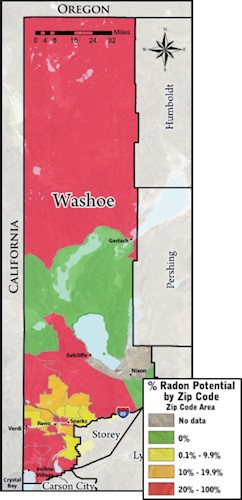 Learn how to reduce the radon health risk
Learn how to reduce the radon health risk
University of Nevada Cooperative Extension offers free test kits at public meetings in January
RENO, Nev. – January is National Radon Action Month, and University of Nevada Cooperative Extension’s Radon Education Program is offering educational presentations at various Reno locations. Free test kits will also be available at the presentations.
Radon is a naturally occurring, radioactive gas that is colorless, odorless and tasteless. It comes from the ground and can accumulate in homes, raising the risk of lung cancer. The U.S. Environmental Protection Agency (EPA) estimates 21,000 Americans die each year from radon-caused lung cancer, killing more people than secondhand smoke, drunk driving, falls in the home, drowning or house fires.
In Nevada, one in four homes tested show radon concentrations at or above the EPA action level. In Washoe County, 21.8 percent of tested homes had elevated radon concentrations above the action level. According to experts, living in a home with radon concentrations at the action level poses as much risk of developing lung cancer as smoking about half a pack of cigarettes a day.
The risk of radon-caused lung cancer can be reduced. A simple three-day test can determine if a house has a radon problem, and winter is an ideal time to test a home for radon. If radon problems are found, they can be fixed. Find out more and get a free test kit at a presentation in your community:
Scheduled presentations for Reno are:
- Jan. 9 – North Valleys Library, 1075 N. Hills Blvd. #340, at 11 a.m.
- Jan. 12 – Sierra View Library, 4001 S. Virginia St., at 4 p.m.
- Jan. 13 – South Valleys Library, 15650A Wedge Parkway, at 6 p.m.
- Jan. 20 – Northwest Reno Library, 2325 Robb Drive, at 5:30 p.m.
For those who cannot attend a presentation, free radon test kits are also available through Feb. 29 at the Washoe County Cooperative Extension office, 4955 Energy Way, in Reno.
The Nevada Radon Education Program is a program of University of Nevada Cooperative Extension and is funded by the Nevada Division of Public and Behavioral Health. Since the program began in 2007, more than 21,000 homes have been tested in Nevada.
Cooperative Extension, the EPA and the Nevada Division of Public and Behavioral Health urge all Nevadans to get their homes tested for radon. For more information, visit the Nevada Radon Education Program website at www.RadonNV.com, or call the Radon Hotline at 888-RADON10 (888-723-6610).
# # #
Photo Cutline: Nearly 21.77 percent of homes tested in Washoe County found radon concentrations at or above the EPA action level. For a radon potential map specific to each Nevada county, go to http://www.unce.unr.edu/programs/sites/radon/results/.
University of Nevada Cooperative Extension is the College of the University of Nevada, Reno that is engaged in every Nevada county, presenting research-based knowledge to address critical community needs. It is a county-state-federal partnership providing practical education to people, businesses and communities. For more information on its programs, visit www.unce.unr.edu.
Nevada’s land-grant university founded in 1874, the University of Nevada, Reno ranks in the top tier of best national universities by U.S. News and World Report and is steadily growing in enrollment, excellence and reputation. The University serves nearly 21,000 students. Part of the Nevada System of Higher Education, the University is home to the University of Nevada School of Medicine, University of Nevada Cooperative Extension and Wolf Pack Athletics. Through a commitment to world-improving research, student success and outreach benefiting the communities and businesses of Nevada, the University has impact across the state and around the world. For more information, visit www.unr.edu.
Contact: Susan Howe
Program Director
Nevada Radon Education Program
University of Nevada Cooperative Extension
4955 Energy Way
Reno, Nevada 89502
775-336-0248
www.RadonNV.com

 Learn how to reduce the radon health risk
Learn how to reduce the radon health risk